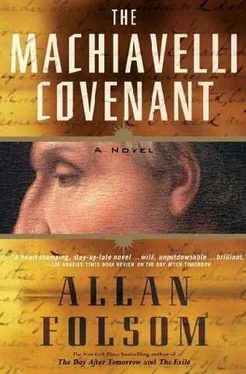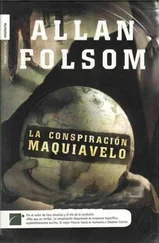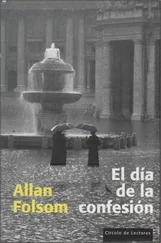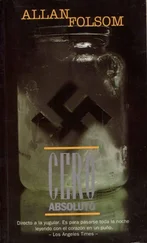In a speech to Congress before he left Washington Harris had promised that he would not make this extensive trip to meet European leaders and "come up empty," and no matter the disappointments in Paris and Berlin, he still had the same resolve. He wanted now to concentrate on the next leg of his trip: Rome and dinner tonight with Italian president Mario Tonti, a man whose position he knew was largely ceremonial but whose job it was to unify factions within Italian politics, which made him a strategically important ally.
Harris considered Italy a friend and both the president and prime minister, Aldo Visconti, men he could rely on. But he also knew Tonti would know the meetings in Paris and Berlin had not achieved the results Harris had wanted. It was a failing that would add an element of awkwardness to their meeting because Italy was very much a part of the European Union, and the European Union's long-range goal was to become the United States of Europe and that was something that always had to be taken into consideration no matter the public deportment of its individual members. So how he would present himself to Tonti, what he would say and how he would say it should have been foremost in his mind. But it wasn't. Lay it to jet lag, to his failures yesterday and today, or to his own personal emotions, the thing foremost on his mind was what had happened to the Parsons family and so quickly afterward, the murder of Caroline Parsons's physician, Lorraine Stephenson. Abruptly he turned to Jake Lowe.
"The fellow who was in Caroline Parsons's hospital room when she died. What did we find out about him?"
Harris could see the crowds lining the street in front of the Kaiser Wilhelm Memorial Church.
"Don't know. It wasn't a priority," Lowe punched some code into his BlackBerry then waited for the information to come up as text.
The president looked to his left and saw they were passing crowds in front of the Hotel Boulevard.
"His name is Nicholas Marten," Lowe read from the text. "He's an American expat living in Manchester, England, and working for a small landscape architectural firm there, Fitzsimmons and Justice." Lowe stopped and read something in silence, then looked to the president. "For some reason Mrs. Parsons signed a notarized letter giving him private access to her personal files and those of her husband."
"Both of them?"
"Yes."
"Why?"
"I don't have an answer."
"See if you can come up with one. This whole thing is increasingly disturbing."
Victor turned from his perch in the hotel room window. "Richard?"
"Yes, Victor."
"The motorcade has passed. It took seven seconds. I saw the limousine window clearly. I would have had a clean shot for three seconds, maybe four."
"Are you sure?"
"Yes, Richard."
"Enough time for a kill shot?"
"With the right ammunition, yes."
"Thank you, Victor."
• WASHINGTON, D.C., 7:10 A.M.
Nicholas Marten had turned the television to the local news channel the moment he got out of bed nearly thirty minutes earlier, hoping to hear something about Dr. Stephenson's "murder." But so far there had been nothing. It made him more curious than ever why the police were still holding the information back, and amazed that some aggressive reporter hadn't discovered the story and broken it.
He'd left the volume up, taken a quick shower, and begun to shave. Among the trivia, traffic, and weather reports he learned that the man shot down by a sniper at Union Station the day before had been a Colombian national in the country legally as a baseball player for the Trenton Thunder, a minor league team affiliated with the New York Yankees. An unnamed source revealed that investigators had recovered the murder weapon from a rented office in the National Postal Museum just across the street from the station. Purportedly it was an M14, a standard U.S. armed forces training rifle, manufactured in the hundreds of thousands by any number of firearms companies.
It seemed like a rather peculiar murder-a minor league ballplayer "assassinated"-but no more than that and Marten went back to shaving, his thoughts on how he could devise a way to retrieve and examine Caroline's medical files. For no particular reason he thought of what she had said to him in the hospital when she'd taken hold of his hand and looked into his eyes and said in hesitant speech-
"They… murdered my… husband and… son… and now they've… killed… me."
"Who are you talking about?" he'd asked. "Who is 'they'?"
"The… the… ca…" she'd said. But it was the most she could do, and her strength gone, she'd fallen asleep. They had been the last words she'd uttered before she'd woken later and told him she loved him and then-died.
Marten felt the emotion begin to creep up in him and he took a moment to collect himself before he finished shaving. Done, he went into the room to dress, determined to drag himself from his still-gaping sorrow and get on with the problem at hand.
"The ca…" he said out loud. "What ca? What was she trying to tell me?"
Immediately he thought of the brief time he'd had inside Caroline's home before her lawyer had asked him to leave. What was there? What could he have seen, if only for a moment, that might give him the answer to what she had been trying to tell him? Besides the shortlived walk-through, and apart from appreciating her homey touches, the only place he'd been where there had been anything definitive was her husband's office. The little time he'd spent there he'd seen what? Photographs of the Parsons family, of Mike Parsons with celebrities. Beyond that had been the stacks of working files that covered most of the congressman's desk with more still on a side table. Those, he remembered, had been clearly labeled in felt pen-COMMITTEE REPORTS AND MINUTES. That was it, nothing more.
Frustrated, Marten pulled on his pants and then sat on the edge of the bed to put on his shoes. As he did, the thought hit and he sat bolt upright.
"Committee reports and minutes," he said out loud. "Committee . How would a person begin to say the word 'committee' in everyday speech? Not ' com -mittee' but-' ca -mittee.'"
Could Caroline have meant that someone on a committee Parsons was a member of was responsible for their deaths? But then she hadn't said someone, she'd used the plural they . So if he was right and she had been referring to a committee, had she meant several members of it or the entire group itself? But how could an entire congressional committee be involved in the complex murders of three people, not to mention the other innocents on board Parsons's chartered plane? The idea was crazy, but for now it was all he had.
By his watch it was just a little after seven thirty in the morning. At two he was to attend Caroline's memorial service at the National Presbyterian Church. That gave him a little more than six hours to try and dig into the history of Mike Parsons's recent congressional service and maybe find some sort of answer, or at least the beginning of one.
Marten opened his electronic notebook, clicked it on and brought up the Google search engine. In Search he typed "Representative Michael Parsons's then hit "Enter."
On the screen popped Parsons's Congressional Web page. Marten breathed a sigh of relief; at least Parsons's name was still in the government database. At the top was "Congressman Michael Parsons, Serving the people of California's 17th District. Monterey, San Benito, Santa Cruz Counties."
Parsons's office locations in Washington and California were listed farther down the page, followed by a place to find the committees he had served on. Marten clicked on that and up came the list.
Committee on Agriculture
Читать дальше












